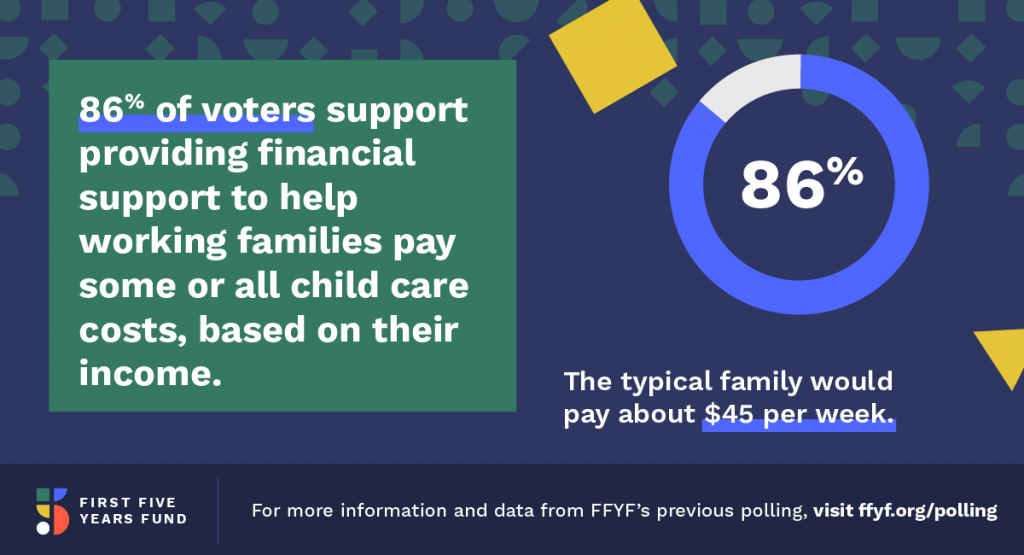By: Marie Huey, Public Policy and Advocacy Coordinator
Lately I’ve had been feeling extra-inspired by my state and national colleagues about where we’re at when it comes to early care and education policy. It feels like a special moment, and it’s important to celebrate those when they come along. So many parts of life are extra stressful and fraught right now. Advocacy can be exhausting. After reflecting on the combination of elements that make this time notable, I wanted to share them with you so that you feel a little inspired too, and maybe even hopeful.
Here are some reasons to get excited about early care and education policy.
There is widespread public support. The First Five Years Fund released a poll earlier this year which showed widespread support for early care and education investments.
- 74% of voters nationwide say elected leaders should make child care and early learning a priority in 2021
- 86% support for making child care more affordable by providing financial support to help working families pay some or all of the cost of quality care.
- 88% support for attracting, retaining, and supporting quality early childhood educators

While many people personally understand the challenges of child care, everyone is affected by access to reliable, quality care.
Elected officials are talking about it. President Biden and Vice President Harris include child care supports in their American Families Proposal. Many members of Minnesota’s Congressional Delegation have introduced or signed on to child care legislation. For instance, the first bill Representative Michelle Fischbach (R-MN-07) introduced was H.R. 1963, the Child Care Choices Act. Representative Dean Phillips (D-MN-03) hosted a roundtable discussion on early care and education. Senators Amy Klobuchar and Tina Smith were part of a group of senators to introduce the Marshall Plan for Moms resolution, which includes support for affordable child care.
Successes during the COVID-19 pandemic. Lawmakers in Minnesota and Washington, D.C. have paid attention to the early care and education field during the pandemic, and it has led to some wins. The Minnesota State Legislature passed $30 million for the Peacetime Emergency Child Care Grants during the 2020 session. They added an additional $10 million. A total of $50 billion nationwide in dedicated funding for child care passed in the federal CARES and American Rescue Plan packages. These emergency funds passed because lawmakers recognized the urgent need to stabilize the sector. It’s a testament to the hard work of individual advocates and organizations. We can build on those wins and relationships as we look to secure ongoing, sustainable funding for the future.
Actual proposals in Congress! There are multiple comprehensive proposals for improving our country’s early care and education system. The Child Care for Working Families Act was reintroduced this year. The Universal Child Care and Early Learning Act is also on the table. The Biden Administration also outlined a proposal in the American Families Plan. The numbers and details differ (here’s a great explainer chart). Having several proposals along with the discussion from lawmakers is encouraging. And there’s a path forward to passing something through budget reconciliation.
Child care is personal to me — that’s why I’ve put it front and center in my Build Back Better Agenda. I’m committed to investing in American families with the expanded Child Tax Credit, universal preschool, and affordable, high-quality child care for all. pic.twitter.com/4KALqDz8Yo
— President Biden (@POTUS) August 13, 2021
It’s the 50th Anniversary of a historic veto. Introduced in 1971, the Comprehensive Child Development Act would have greatly expanded access to quality child care. The bill passed both bodies of Congress, but President Nixon vetoed it. Certainly, the current child care landscape would look drastically different if the bill had become law. But since we can’t go back in time, now is the best time to get a proposal across the finish line.
Here’s where the caveats come in. Even if a national policy passes, it is imperative to ensure that it is equitable, and that will be a challenge. A mixed delivery system that centers the needs of families and supports the wonderfully diverse field is essential. The details do matter, and we’re not there yet. I’d encourage you to join in now and be part of the efforts to make a difference in the lives of young children and families.
But, as we keep moving forward, it’s also important to take a moment to reflect and celebrate. Hard work of advocates in this field is the main reason for this positivity. Whether it’s informing a neighbor or friend about the importance of your work as an early childhood educator or calling or meeting with a Member of Congress, this moment is evidence of that work paying off.
Thank you to all the advocates who make being part of this effort so rewarding.








